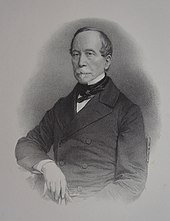Nicolas Changarnier
Nicolas Anne Théodule Changarnier (born April 26, 1793 in Autun , Saône-et-Loire department , † February 14, 1877 in Versailles , Seine-et-Oise department ) was a French Général de division .
Life
Changarnier came to the Saint-Cyr Military School as a cadet and received extensive military training there. In 1815 he joined the royal guard as a sous-lieutenant and went to Algeria as captain in 1830 . There Changarnier was instrumental in the conquest of Constantine on October 13, 1837 .
As chief de bataillon , Changarnier rendered important services during the retreat and gradually advanced through Colonel and Général de brigade to Général de division , having participated in almost all the battles of the French army in Algeria for 18 years .
In February 1848 Changarnier took over in place of Governor Louis-Eugène Cavaignac for a time the provisional government of Algeria, but gave it up again because he was elected to the National Assembly by the Seine department . In Paris he became commander of the National Guard and soon after of the 1st Military Division. On January 29, 1849 and June 13, he prevented the Republicans and Socialists from raising their signs.
In general, he was considered to be the sword of the monarchical party, namely the Orléans. Because of his opposition to the Prince-President Louis Napoleon , he was removed from command of the Parisian troops in January 1851 and arrested with other republican generals the night before the coup on December 2 .
Exiled from France by decree of January 9, 1852, he lived in Mechelen until the general amnesty . In the Franco-Prussian War of 1870/71 he offered his services to the War Ministry, but received no command; but on August 8 the emperor summoned him to his headquarters in Metz to listen to his advice. Changarnier stayed with the enclosed army under the command of Marshal François-Achille Bazaine in the fortress of Metz , took part in the council of war, negotiated in vain on 25 October with Prince Friedrich Karl Nikolaus of Prussia about an armistice or free withdrawal of the army on behalf of Bazaine Algeria and finally signed the surrender with the rest of the commanders .
After the war he became a member of the court martial, which had to investigate the behavior of several generals. As a member of the National Assembly, Changarnier joined a group that attacked the left most severely and thus contributed significantly to the overthrow of President Adolphe Thiers . In the attempt to establish the monarchy , he took part in 1873 with great zeal, in 1875 fought against the constitution of the III. Republic and joined the ultramontane party.
Nicolas Changarnier died on February 14, 1877 in Versailles at the age of 84.
In his work The Class Struggles in France from 1848 to 1850, Karl Marx describes the German-born General Maximilian Georg Joseph Neumayer as Changarnier's right arm .
Works
- Mémoires du Général Changarnier. Campagnes du l'Afrique 1830–1848 . Berger-Levrault, Paris 1930.
- The reorganization of the French army . Publishing house Aue, Stuttgart 1867.
literature
- Adhemar d'Antioche: Changarnier . Paris 1891.
Individual evidence
| personal data | |
|---|---|
| SURNAME | Changarnier, Nicolas |
| ALTERNATIVE NAMES | Changarnier, Nicolas Anne Théodule (full name) |
| BRIEF DESCRIPTION | French general de division |
| DATE OF BIRTH | April 26, 1793 |
| PLACE OF BIRTH | Autun , Saône-et-Loire department |
| DATE OF DEATH | February 14, 1877 |
| Place of death | Versailles , Seine-et-Oise department |

